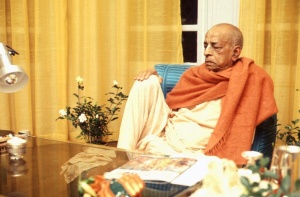SB 10.24.5: Difference between revisions
m (1 revision(s)) |
(Vanibot #0018 edit: make synonym terms in Sanskrit italic in SB - Vanisource) |
||
| Line 1: | Line 1: | ||
{{info | {{info | ||
|speaker=Lord | |speaker=Lord Kṛṣṇa the Supreme Personality of Godhead | ||
|listener=King Nanda | |listener=King Nanda | ||
}} | }} | ||
[[Category:Srimad-Bhagavatam - Canto 10 Chapter 24|s05]] | |||
[[Category:Bhagavatam Verses Spoken by Lord Krsna - Vanisource|102405]] | |||
<div style="float:left">'''[[Srimad-Bhagavatam]] - [[SB 10|Tenth Canto]] - [[SB 10.24: Worshiping Govardhana Hill|Chapter 24: Worshiping Govardhana Hill]]'''</div> | |||
<div style="float:right">[[File:Go-previous.png|link=SB 10.24.4]] '''[[SB 10.24.4]] - [[SB 10.24.6]]''' [[File:Go-next.png|link=SB 10.24.6]]</div> | |||
{{RandomImage}} | |||
{{SBnotice}} | |||
==== TEXT 5 ==== | ==== TEXT 5 ==== | ||
<div | <div class="verse"> | ||
udāsīno 'ri-vad varjya | :udāsīno 'ri-vad varjya | ||
ātma-vat suhṛd ucyate | :ātma-vat suhṛd ucyate | ||
</div> | </div> | ||
| Line 15: | Line 20: | ||
==== SYNONYMS ==== | ==== SYNONYMS ==== | ||
<div | <div class="synonyms"> | ||
''udāsīnaḥ''—one who is indifferent; ''ari-vat''—just like an enemy; ''varjyaḥ''—is to be avoided; ''ātma-vat''—like one's own self; ''suhṛt''—a friend; ''ucyate''—is said to be. | |||
</div> | </div> | ||
{{SBcollapse}} | |||
==== TRANSLATION ==== | ==== TRANSLATION ==== | ||
<div | <div class="translation"> | ||
One who is neutral may be avoided like an enemy, but a friend should be considered like one's own self. | One who is neutral may be avoided like an enemy, but a friend should be considered like one's own self. | ||
</div> | </div> | ||
| Line 29: | Line 34: | ||
==== PURPORT ==== | ==== PURPORT ==== | ||
<div | <div class="purport"> | ||
Even if Nanda Mahārāja did not see friends, enemies and neutral parties as entirely equal, Lord Kṛṣṇa, being Nanda Mahārāja's son, was certainly a most trustworthy friend and should therefore not be left out of intimate discussions. In other words, Nanda Mahārāja might have thought that as a householder he could not act on the highest saintly platform, and thus Lord Kṛṣṇa furnished additional reasons why His father should trust Him and reveal the entire purpose of the sacrifice. | Even if Nanda Mahārāja did not see friends, enemies and neutral parties as entirely equal, Lord Kṛṣṇa, being Nanda Mahārāja's son, was certainly a most trustworthy friend and should therefore not be left out of intimate discussions. In other words, Nanda Mahārāja might have thought that as a householder he could not act on the highest saintly platform, and thus Lord Kṛṣṇa furnished additional reasons why His father should trust Him and reveal the entire purpose of the sacrifice. | ||
According to Śrīla Jīva Gosvāmī, Nanda Mahārāja stood silent, doubting his position of parental aloofness, since Garga Muni had predicted that his son would be "equal to Nārāyaṇa in His qualities," and the young boy had already conquered and killed many powerful demons. | According to Śrīla Jīva Gosvāmī, Nanda Mahārāja stood silent, doubting his position of parental aloofness, since Garga Muni had predicted that his son would be "equal to Nārāyaṇa in His qualities," and the young boy had already conquered and killed many powerful demons. | ||
</div> | </div> | ||
__NOTOC__ | </div> | ||
</div> | |||
<div style="float:right">[[File:Go-previous.png|link=SB 10.24.4]] '''[[SB 10.24.4]] - [[SB 10.24.6]]''' [[File:Go-next.png|link=SB 10.24.6]]</div> | |||
__NOTOC__ | |||
__NOEDITSECTION__ | |||
Revision as of 13:30, 1 December 2017

A.C. Bhaktivedanta Swami Prabhupada
Please note: The synonyms, translation and purport of this verse were composed by disciples of Śrīla Prabhupāda
TEXT 5
- udāsīno 'ri-vad varjya
- ātma-vat suhṛd ucyate
SYNONYMS
udāsīnaḥ—one who is indifferent; ari-vat—just like an enemy; varjyaḥ—is to be avoided; ātma-vat—like one's own self; suhṛt—a friend; ucyate—is said to be.
Translation and purport composed by disciples of Śrīla Prabhupāda
TRANSLATION
One who is neutral may be avoided like an enemy, but a friend should be considered like one's own self.
PURPORT
Even if Nanda Mahārāja did not see friends, enemies and neutral parties as entirely equal, Lord Kṛṣṇa, being Nanda Mahārāja's son, was certainly a most trustworthy friend and should therefore not be left out of intimate discussions. In other words, Nanda Mahārāja might have thought that as a householder he could not act on the highest saintly platform, and thus Lord Kṛṣṇa furnished additional reasons why His father should trust Him and reveal the entire purpose of the sacrifice.
According to Śrīla Jīva Gosvāmī, Nanda Mahārāja stood silent, doubting his position of parental aloofness, since Garga Muni had predicted that his son would be "equal to Nārāyaṇa in His qualities," and the young boy had already conquered and killed many powerful demons.